Topics

Dr. Lydia Malin
Researcher for Supply of skill needs
Tel: +49 221 4981-850 Mail: malin@iwkoeln.de Lydia Malin- Joined the German Economic Institute in 2012
- B.A. Studied Social Sciences at the University of Dusseldorf
- M. Sc. sociology and empirical social research as well as doctorate at the University of Cologne
- Project Kompetenzzentrum Fachkräftesicherung
Research unit
IW Publications
Malin, Lydia / Schumacher, Simon, 2024, Pharmaindustrie. Steigender Druck auf dem Arbeitsmarkt, IW-Report, Nr. 2, Köln
Zur Studie
Kirchhoff, Jasmina / Malin, Lydia / Schumacher, Simon, 2022, Pharmaindustrie im Wandel. Fachkräftebedarfe in Zeiten transformatorischer Herausforderungen, in: IW-Trends, 49. Jg., Nr. 2, S. 97-116
Zur Studie
Flake, Regina / Janßen, Simon / Leschnig, Lisa / Malin, Lydia / Seyda, Susanne, 2021, Berufliche Weiterbildung in Zeiten von Corona. Kein dramatischer Einbruch, aber deutliche gruppenspezifische Unterschiede, IW-Report, Nr. 43, Köln
Zur Studie
(in cooperation with Regina Flake, Paula Risius)
Einflussfaktoren der Bildungsentscheidung von Abiturienten für Ausbildung oder Studium
IW-Trends 3/2017
(in cooperation with Regina Flake, Lena Middendorf, Susanne Seyda)
Qualifizierung von An- und Ungelernten – Eine empirische Bestandsaufnahme der Lebenssituation und Potenziale
IW-Analysen – Forschungsberichte Nr. 100, Köln 2014
(in cooperation with Ina Esselmann, Wido Geis)
Junge Menschen ohne beruflichen Abschluss
IW-Trends 4/2013
(in cooperation with Vera Demary, Susanne Seyda, Dirk Werner)
Berufliche Weiterbildung in Deutschland - Ein Vergleich von betrieblicher und individueller Perspektive
IW-Analysen – Forschungsberichte Nr. 87, Köln 2012
Expertises
(in cooperation with Anika Jansen, Susanne Seyda, Regina Flake)
Fachkräftesicherung in Deutschland – diese Potenziale gibt es noch
Studie für das Kompetenzzentrum Fachkräftesicherung (KOFA), 2019
(in cooperation with Anika Jansen, Regina Flake)
Wie Unternehmen Beschäftigungspotenziale von Frauen noch besser nutzen können - Flexible Arbeitszeitmodelle ermöglichen Frauen den Schritt in Männerberufe
Studie für das Kompetenzzentrum Fachkräftesicherung (KOFA), 2018
(in cooperation with Anika Jansen, Paula Risius, Sebastian Schirmer, Dirk Werner)
Fachkräftecheck Metall- und Elektroberufe – Analyse der Fachkräftesituation
Studie für das Kompetenzzentrum Fachkräftesicherung (KOFA), 2018
(in cooperation with Anika Jansen, Paula Risius, Sebastian Schirmer, Dirk Werner)
Fachkräftecheck Metall- und Elektroberufe in Hessen – Analyse der Fachkräftesituation in Hessen
Studie für das Kompetenzzentrum Fachkräftesicherung (KOFA), 2018
(in cooperation with Alexander Burstedde, Regina Flake, Paula Risius, Dirk Werner)
Fachkräfte für die digitale Transformation – Arbeitsmarktsituation und Gestaltungsmöglichkeiten
Gutachten für die Stiftung Familienunternehmen
(in cooperation with Alexander Burstedde, Paula Risius)
Rezepte gegen den Fachkräftemangel
Studie für das Kompetenzzentrum Fachkräftesicherung (KOFA), 2017
(in cooperation with Regina Flake, Paula Risius)
Ausbildung oder Studium? – Wie Unternehmen Abiturienten bei der Berufsorientierung unterstützen können
Studie für das Kompetenzzentrum Fachkräftesicherung (KOFA), 2017
External Publications
(in cooperation with Paula Risius)
Bildungsentscheidungen von Abiturienten: Zwischen Ausbildung und Studium
Handbuch der Aus- und Weiterbildung, Aktualisierungslieferung Nr. 309, 2019
(in cooperation with Sebastian Schirner)
Fachkräftemangel am Bau: Analysieren und entgegenwirken!
UnternehmerBrief Bauwirtschaft, 42. Jg., Heft 3, 2019
(in cooperation with Marita Jacob)
Gendered occupational aspirations of boys and girls in Germany: The different impact of local VET Markets
Journal of Vocational Education & Training, 2018, DOI: 10.1080/13636820.2018.1517128
(in cooperation with Ramsey Wise)
Glass Ceilings, Glass Escalators and Revolving Doors: Comparing Gendered Occupational Trajectories and the Upward Mobility of Men and Women in West Germany
Gilbert Ritschard, Matthias Studer (eds): Sequence Analysis and Related Approaches. Life Course Research and Social Policies, vol 10, 2018
(in cooperation with Regina Flake, Lena Middendorf, Susanne Seyda)
Lebenssituation und Potenziale An- und Ungelernter
Britta Matthes und Eckart Severing (Hrsg.): Berufsbildung für Geringqualifizierte – Barrieren und Erträge, Bonn, 2017, S. 13–29
(in cooperation with Susanne Seyda)
Betriebliche Weiterbildung legt zu
Jörg E. Feuchthofen (Hrsg.): Wirtschaft und Beruf, 64. Jg., Nr. 5–6, 2012, S. 25–28
(in cooperation with Susanne Seyda, Corinna Michalski)
Konsequenzen aus der IW-Weiterbildungserhebung 2011 – Herausforderungen für die Weiterbildung
Jürgen Scholl (Hrsg.): Weiterbildung, Zeitschrift für Grundlagen, Praxis und Trends, Heft 5, 2012, S. 31–33
More from Dr. Lydia Malin
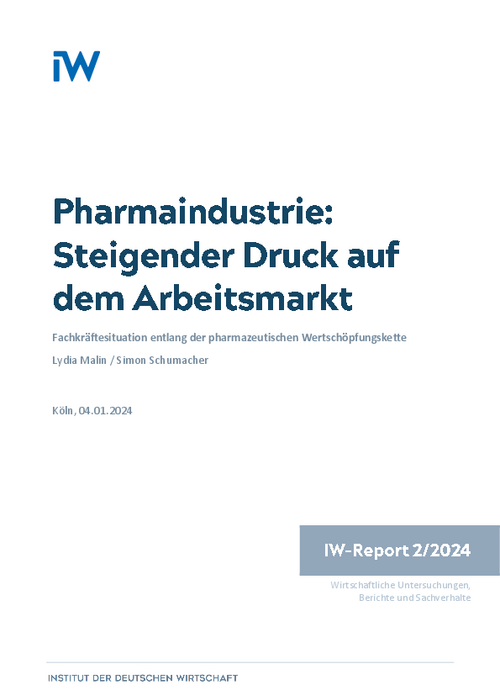
Pharmaceutical industry: Increasing pressure on the labor market
The shortage of skilled workers poses significant challenges for pharmaceutical companies in Germany and is expected to become increasingly problematic in the context of demographic changes. Concerning Germany's positioning in the international competition among innovative pharmaceutical locations, this shortage could become a hindrance.
IW
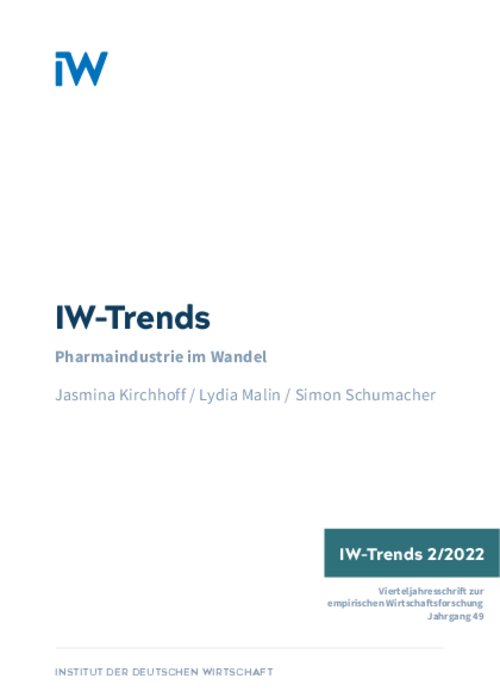
Pharmaceuticals in Transition: The Need for Skilled Labour in an Era of Digital Transformation
The shortage of skilled workers is increasingly confronting companies in Germany with major challenges. In view of the demographic and transformational tasks, there is a considerable danger that this situation will exacerbate.
IW
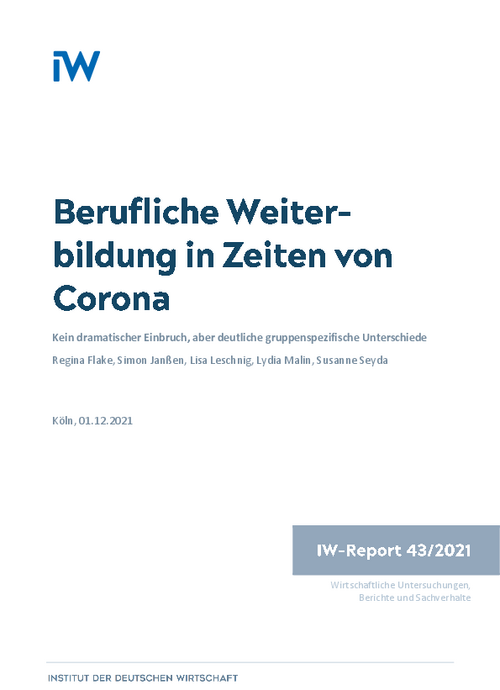
Professional Training in times of Corona
Despite the corona-related contact restrictions, participation in continuing vocational education and training (CET) had not declined massively by summer 2020. This is because a large part of the measures could still take place thanks to corresponding digital offers. However, there are significant differences depending on the employment sector, qualification level, gender and number of children of the participants in CET.
IW
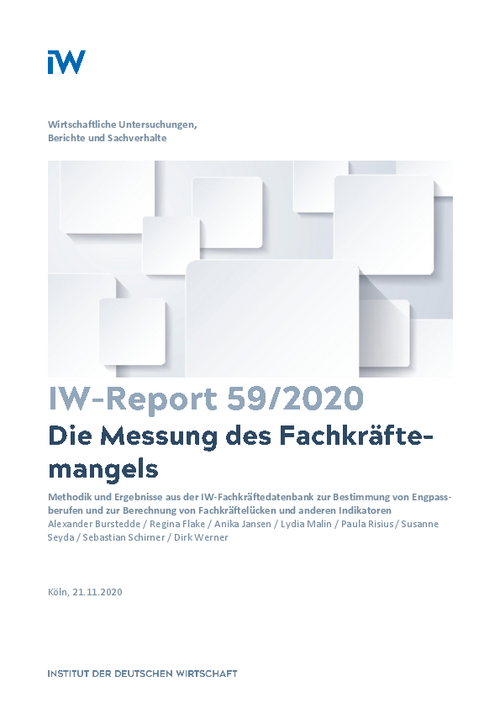
Measuring the shortage of skilled workers
The present IW-Report introduces a new methodology for measuring the shortage of skilled workers and thus makes a central contribution to mapping the skilled worker situation in Germany. First, a definition of the term "shortage of skilled workers" is presented. Afterwards, its operationalization is discussed.
IW
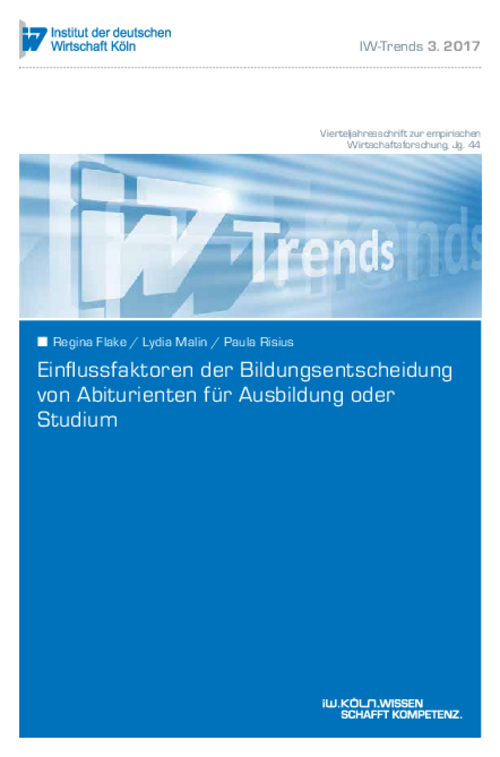
How High School Graduates Decide Between a University Course and Vocational Trai
The proportion of school students who take and pass the German Abitur exams (equivalent to British ‘A’-levels or the American high school diploma) has been increasing for many years.
IW
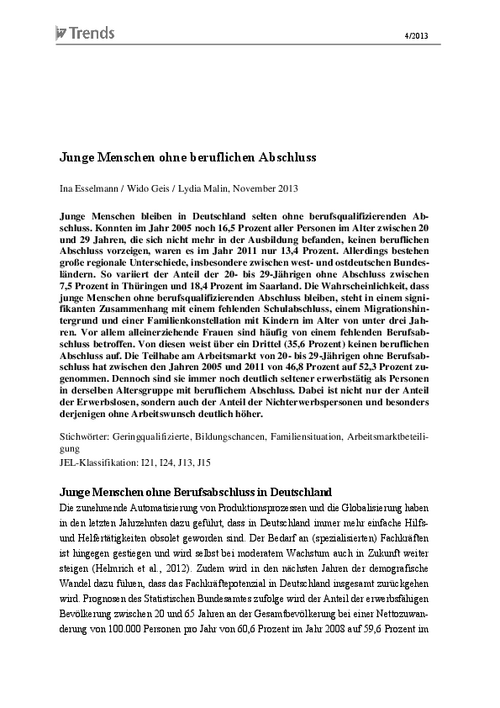
Young People Without a Vocational Qualification
Few young people in Germany fail to obtain a vocational qualification. While in 2005, 16.5 per cent of all those between the ages of 20 and 29 years who were no longer in for-mal education had no vocational training, by 2011 this figure had fallen to 13.4 per cent. However, there are considerable regional differences, particularly between western and eastern German states. Thus the proportion of unqualified 20- to 29-year-olds varies between 7.5 per cent in Thuringia and 18.4 per cent in the Saarland. The probability of young people failing to obtain a vocational qualification correlates significantly with the lack of a school-leaving certificate, a migration background and a family constellation with children under three years of age. Single mothers are significantly less likely to complete formal training, with over a third (35.6 per cent) lacking a qualification. Participation in the labour market by 20- to 29-year-olds without a vocational qualification increased between 2005 and 2011 from 46.8 to 52.3 per cent. Nevertheless, they continue to be employed consider-ably less often than persons in the same age group with a formal qualification. Indeed, not only the proportion of unemployed is considerably higher but also the share of those economically inactive and particularly those not seeking work.Download | PDF
IW